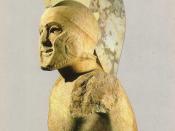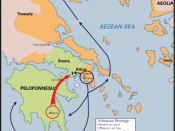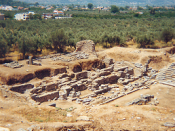HAMMOND:
In the 200-300 years before the C5th BC, Gk interstate relationships became more complicated and sophisticated. Initially, these were governed mainly by religious considerations - oracles, shrines, festivals, pilgrimages and Amphictyones were universally recognised and guarantee against attack.( 166). Commecially, interstate contacts increased. Eg, at Naucratis, the Hellenium founded by 9 states and the market was controlled by their trade representatives.
After the Second Messian War ( c. 640-620), Sparta reached her artistic and commercial peak (166). Her conservative constitution was confirmed; she deposed the last tyrant at Corinth (c 582) and helped, probably, Elis gain control of the Olympic festival (167). Significantly, Sparta fought with and defeated Tegea, BUT instead of annexing Tegea's territory, Sparta made a permanent settlement with her on the basis of a defensive alliance. The treaty probably contained a clause under which Tegea undertook to banish all Messenians from her territory. This soon after 560.
This alliance, marked the transition to a new policy, of which the declared aims were liberation from tyranny and prtoection against Argos. Hamm. stressed that these declarations were welcomed by other states and well timed because tyranny was in decline and Argos' truculence was causing concern. Sparta's track-record was good: she favoured Delphi, had liberated Corinth from tyranny and had struck a permanent alliance with Tegea. She had also declared herself the champion of non-Dorian people by paying reverence to Orestes, their hero. She intended to extend the permanent alliances to blunt the power of Argos; this was of advantage to other states because of Sparta's military strength.
The Spartan policy, initiated probably by her famous statesman, Chilon, was brilliantly successful. Many states in the central and northern Peloponnese accepted the offer of alliance. In 555, Sicyon, and possibly Philius and Megara were liberated from tyrants. Modern scholars...


